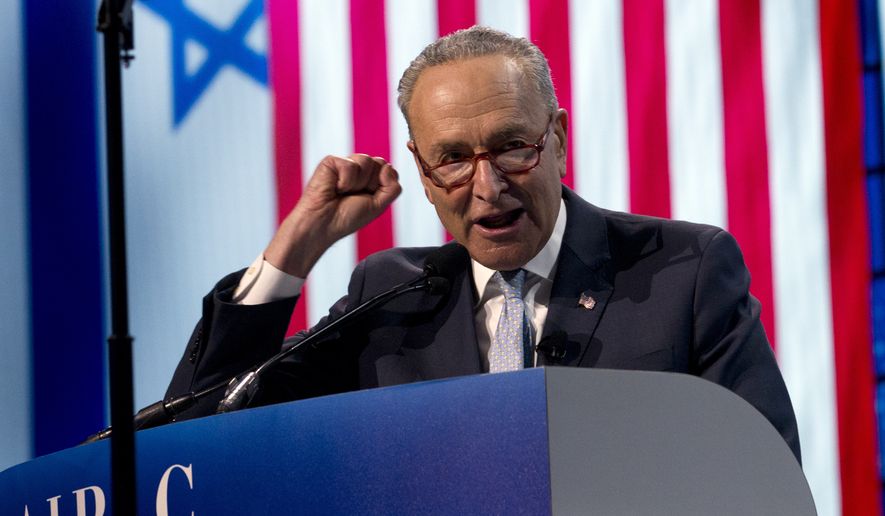Democrats struggled Monday to defend their party’s nasty split over support for Israel, begging the American Israel Public Affairs Committee’s annual conference to look past the comments of some freshmen lawmakers and trust the years of support shown by party leaders.
While Republicans chided Democrats for failing to take a tougher stand on anti-Semitic comments, Democrats — and AIPAC members — said Republicans were going too far in trying to create a political issue.
“Not only is it demonstrably false to say Democrats are anti-Israel. It also hurts the Israel-U.S. relationship,” said Senate Minority Leader Charles E. Schumer, New York Democrat, rebutting President Trump’s claims that Democrats have strayed beyond anti-Israel and into being “anti-Jewish.”
Mr. Schumer derided attempts to score “political points” over the relationship between the two nations.
“Plain and simple, the Democratic Party supports Israel, and we will continue to do so,” he told AIPAC.
But his party has fed the narrative after House Democrats stumbled in responding to comments by Rep. Ilhan Omar, a Minnesota Democrat who so far this year has said lawmakers who support Israel were bought by AIPAC and that Jewish lawmakers hold dual loyalty — both classic anti-Semitic tropes.
SEE ALSO: Mike Pompeo warns anti-zionism is ‘new’ anti-semitism at AIPAC
Her party’s leaders first denounced her and then tried to explain her comments as insensitive. They planned a resolution to denounce her comments, but a rebellion among progressives forced them to load it down with a more general condemnation of hate.
On Sunday, House Majority Leader Steny H. Hoyer, Maryland Democrat, seemed to deliver a rebuke to Ms. Omar and fellow freshmen Reps. Alexandria Ocasio-Cortez of New York and Rashida Tlaib of Michigan. “By the way, there are 62 freshman Democrats. Do you hear me? There are 62, not three,” he told AIPAC.
By Monday, he was backpedaling, saying he was “misinterpreted” and intended his comments to be a rebuke to the media, which he said gives a disproportionate amount of attention to the three liberal congresswomen.
Democrats’ troubles go well beyond those three, though. In the wake of the Omar furor, liberal groups demanded a boycott of AIPAC, and several of the party’s leading presidential candidates complied with the boycott.
AIPAC attendees said they found Ms. Omar’s comments to be unquestionably anti-Semitic but largely seemed to accept Democrats’ explanations that she doesn’t represent a shift in the party’s thinking.
“Nobody has to support AIPAC,” Rachel Howard, Louisiana College Republican state chair, told The Washington Times. “Even though I don’t agree with really anything that comes out of her mouth — she still has the right to say it.”
SEE ALSO: Kevin McCarthy blasts Democrats Ilhan Omar’s anti-semitic response
Yet attendees said Democrats need to tackle anti-Semitism directly and without lumping it in with other forms of bigotry.
“In no way does one person’s remark reflect the whole party,” Jessica Browning, an AIPAC attendee from Texas, told The Times. But “the party does need to do something if there’s someone saying things that are not right.”
Republicans said Democrats have had those chances and fallen short.
“Anti-Semitism has no place in the Congress of the United States of America,” Vice President Mike Pence told the crowd.
House Minority Leader Kevin McCarthy, California Republican, echoed Mr. Pence. He said Democrats botched the attempt to rebuke anti-Semitism after Ms. Omar’s second set of comments.
“I was embarrassed that the last resolution had to be watered down,” he said. “I was embarrassed that they split it.”
AIPAC attendees, though, said the strong lineup of Democrats who are speaking — including Mr. Schumer on Monday and House Speaker Nancy Pelosi on Tuesday — is proof of the party’s commitment.
“They’re sending a very direct message that this is still a bipartisan issue,” Ms. Howard said.
Evan Ross, who came to AIPAC from Miami, said Republican attacks on Democrats could end up doing more damage to Israel’s cause.
“It scares me when I hear the president, the vice president trying to make support for Israel a partisan issue,” he said. “If Israel becomes a partisan issue, that becomes a danger because the politics will shift back and forth.”
Mr. Schumer, though, acknowledged there is a broader danger with waning support for Israel among younger Americans.
“I fear too many in our younger generation don’t have the understanding of the threats facing Israel as my generation did,” he said. “They don’t know that as long as Israel has existed, she has had to defend herself from enemies who seek to wipe her off the map.”
Mr. Schumer also directed criticism at Mr. Trump for comments after the deadly white supremacist rally in Charlottesville, Virginia.
“When someone looks at a neo-Nazi rally and sees some ’very fine people’ among its company, we must call it out,” he said.
• Gabriella Muñoz can be reached at gmunoz@washingtontimes.com.




Please read our comment policy before commenting.